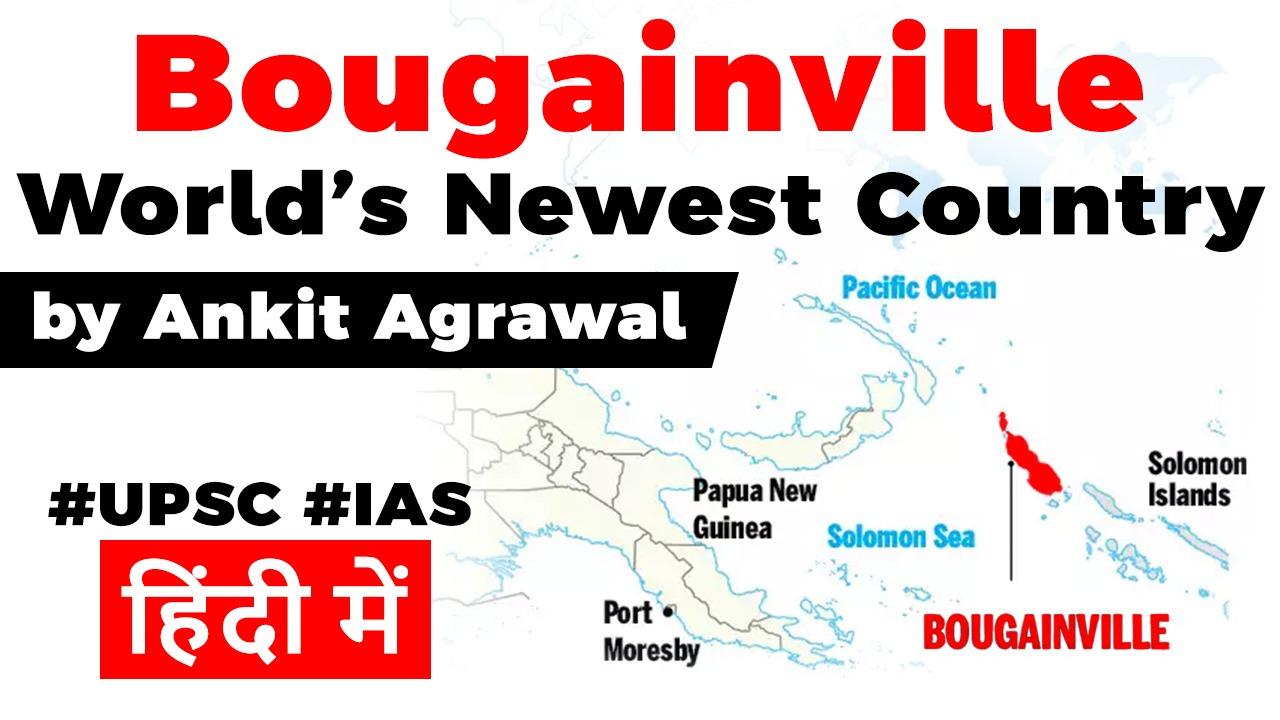Table of Contents
CONTEXT
- The South Pacific islands of Bougainville have overwhelmingly voted to be independent from Papua New Guinea.





WHY IS BOUGAINVILLE AN AUTONOMOUS REGION?
- Bougainville being an autonomous region of Papua New Guinea lies in its history.
- The island’s had inhabited by its indigenous population for
- But it got its name after French colonizer Louis-Antoine de Bougainville (colonise new territory for France).
- In 1885, the island of Bougainville came under the German protectorate of German New Guinea.
- The outbreak of WWI changed the power structure in the Pacific and in 1914, Bougainville and other islands nearby, fell under the control of Australian
- After WWII, Japan withdrew from the island and Australia taking over its administration.
- This arrangement lasted till 1975, ending with Papua New Guinea gaining independence.
- There have been previous attempts to declare Bougainville independent—
- When Papua New Guinea became an independent country in 1975, and again in 1990.
- In the late 1970s, a decentralised system of provincial government was introduced in Bougainville.
- The current autonomy arrangements were implemented following the constitutional enactment of the Bougainville Peace Agreement in 2001.

WHY BOUGAINVILLE WANTS COMPLETE INDEPENDENCE FROM PAPUA NEW GUINEA?
- The conflict in Bougainville and the desire of Bougainvillean people for independence is rooted in the historic plunder of the resource- rich island that has large deposits of copper and the unequal distribution of wealth that followed.
- Rio Tinto that controlled 56% of stake while the Papua New Guinea government owned 20% till 1989.
- There has subsequently been dissatisfaction among Bougainvilleans over implementation of the agreedThere is dissatisfaction particularly in regard to the constitutionally guaranteed financial grants to which the Autonomy Bougainville Government (ABG) is legally entitled, but which the (Papua New Guinea) National Government has not provided arrangements for Bougainville autonomy,
- The mining has also caused environmental degradation of Bougainville’s lands and water.

RESULT OF THE REFERENDUM
- Chairman of the Bougainville Referendum Commission Bertie Ahern declared that-
- 1,76,928 people — around 98% of voters — had backed independence.
- Only 3,043 supporting the option of remaining part of Papua New Guinea with more autonomy.
SO, IS IT CONFIRMED THAT BOUGAINVILLE WILL GAIN INDEPENDENCE?
- No, the independence will not be immediate, a long political process lies ahead.
- The result must first be ratified by Papua New Guinea’s parliament — where there is opposition to the move for fear it may spark other independence movements in a nation defined by disparate linguistic and tribal groups.
- But the scale of the victory for the pro-independence side will heap pressure on PNG.
LOSS FOR PNG?
- Papua Guinea has much to lose if Bougainville gains independence, especially in terms of access to Bougainville’s natural resources.
- It my also have huge impact on Papua New Guinea’s territories where other provinces in Papua New Guinea may start the demand for independence.
STAKE FOR AUSTRALIA, CHINA, THE UNITED STATES?
- Due to shifting powers, diplomacy and developing military and economic interests in the Asia-Pacific, the Bougainville referendum is going to have consequences not just for immediate neighbours.
- There are certainly prominent Bougainvilleans who see a great deal of unrealised potential in developing relations with China.
























 WhatsApp
WhatsApp